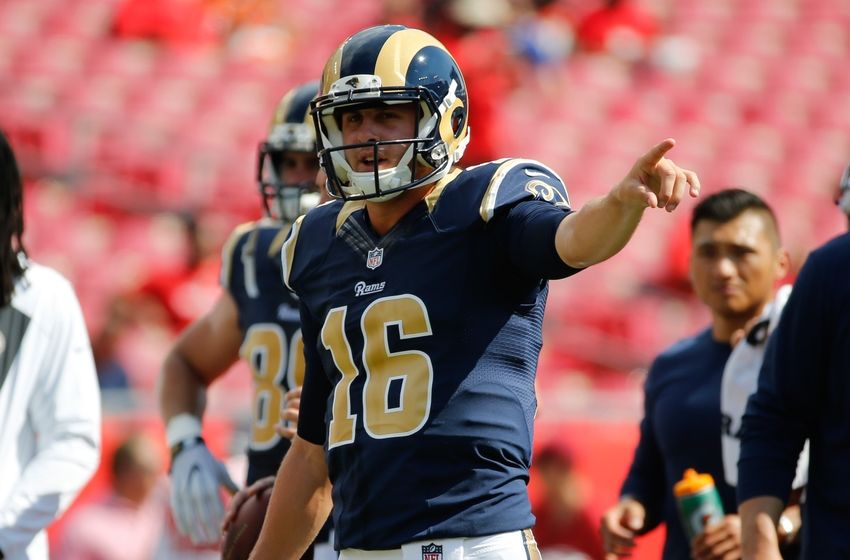- Joined
- Feb 9, 2014
- Messages
- 20,922
- Name
- Peter
http://mmqb.si.com/mmqb/2017/05/17/nfl-problem-rookie-quarterbacks-not-enough-practice-time
Why You Can’t Let Young QBs Learn from the Bench
Every team would love to keep its highly drafted quarterback under wraps for a season or two so he can slowly transform into a franchise player, but it’s a pipedream in today’s NFL
by Andy Benoit

Credit: Kim Klement-USA TODAY Sports
Every year we see NFL teams draft an unready quarterback in the first or second round, with the intention of having him learn from the bench as a rookie. The Bears (Mitchell Trubisky), the Texans (Deshaun Watson) and especially the Chiefs (Pat Mahomes) will toy with this idea in 2017.
It’s a logical and admirable approach. Every team wants its guy to be like Aaron Rodgers emerging from Brett Favre’s shadow, turning an apprenticeship into stardom. The only problem: that never happens anymore.
Literally. It … does … not … happen. Since 2006, no team that drafted a quarterback in the first two rounds sat him for the entirety of his rookie season and then saw him become a long-term franchise quarterback.
In fact, only two QBs in that time who sat out their entire rookie seasons have even gone on to start at least 48 games: Colin Kaepernick, with the 49ers, and Chad Henne, with the Dolphins.
The previous generation of quarterbacks saw a handful of highly drafted players sit and learn. The best examples were Carson Palmer in Cincinnati, Drew Brees in San Diego, Philip Rivers in San Diego, and, of course, Rodgers in Green Bay.
There were also the unique cases of Tony Romo and Tom Brady, guys who were brought in to fill the back of the roster and wound up developing well enough to become quality starters once they took the field. (Incidentally, both permanently replaced Drew Bledsoe.)
But those quarterbacks were all drafted at least 12 years ago. No one has followed that path since.
What’s changed in those dozen years? You can start at everyone’s favorite place and blame the culture. The NFL is an impatient, win-now league more than ever!
There’s some truth to that, plus the simple fact that teams who draft a quarterback in the early rounds usually do so because they didn’t have a good one to begin with. The Favre-led Packers selecting Rodgers is an extreme outlier. Many teams with highly drafted QBs don’t have a solid starter for him to sit behind.
But the bigger issue is time. In 2011, the current collective bargaining agreement significantly reduced practice hours, both during the season and and during the offseason. Naturally, it’s the backup players’ reps that disappear.
There’s barely enough time for the first-teamers to practice. Which means the only way to evaluate a QB and let him learn kinetically is to put him with your first team. And voila! There’s your new starting quarterback.
Eventually, something will give. Stylistically, the NFL and college games are drifting farther and farther apart. Incoming NFL quarterbacks are less prepared each year. With fewer chances for them to practice, young quarterbacks must continue to learn under the fire of live games. This diminishes the NFL’s product and can help ruin careers.
There is, however, one saving grace. The nature of today’s pass-happy NFL is prolonging quarterbacks’ careers. The days of repetitive deep dropback passes are practically over. Teams now regularly throw the ball quickly after the snap. Quicker, shorter passes place a greater emphasis on the intellectual side of quarterbacking and less on the physical side.
A quarterback no longer has to consistently throw the ball as far or hold it as long. Instead, he’s reading the defense more before the snap, which is how he’s able to throw so quickly after it. (This is how most college offenses operate, but they’re executing many of those quick throws differently than what you see in the NFL.
In college, the hash marks are spaced farther apart, which allows for wider formations. The wider side of these formations create more defined, almost indefensible quick throws. Everything becomes easier for the quarterback.)
Look at all the thirtysomething quarterbacks who are still performing at their highest levels:
Tom Brady, almost 40
Drew Brees, 38
Carson Palmer, 37
Eli Manning, 36
Philip Rivers, 35
Ben Roethlisberger, 35
Peyton Manning threw for 5,477 yards at age 37 and, after finally getting pushed up against the ropes by Father Time, still won a Super Bowl at age 39.
The NFL no longer gives young quarterbacks enough time to develop, but at least more stars at this position are staying around a little longer. At some point, of course, new quarterbacks will be needed. Hopefully in the next CBA teams can get back to practicing more. Developing QBs from the bench needs to be a real option rather than the pipedream that it has become.
Why You Can’t Let Young QBs Learn from the Bench
Every team would love to keep its highly drafted quarterback under wraps for a season or two so he can slowly transform into a franchise player, but it’s a pipedream in today’s NFL
by Andy Benoit

Credit: Kim Klement-USA TODAY Sports
Every year we see NFL teams draft an unready quarterback in the first or second round, with the intention of having him learn from the bench as a rookie. The Bears (Mitchell Trubisky), the Texans (Deshaun Watson) and especially the Chiefs (Pat Mahomes) will toy with this idea in 2017.
It’s a logical and admirable approach. Every team wants its guy to be like Aaron Rodgers emerging from Brett Favre’s shadow, turning an apprenticeship into stardom. The only problem: that never happens anymore.
Literally. It … does … not … happen. Since 2006, no team that drafted a quarterback in the first two rounds sat him for the entirety of his rookie season and then saw him become a long-term franchise quarterback.
In fact, only two QBs in that time who sat out their entire rookie seasons have even gone on to start at least 48 games: Colin Kaepernick, with the 49ers, and Chad Henne, with the Dolphins.
The previous generation of quarterbacks saw a handful of highly drafted players sit and learn. The best examples were Carson Palmer in Cincinnati, Drew Brees in San Diego, Philip Rivers in San Diego, and, of course, Rodgers in Green Bay.
There were also the unique cases of Tony Romo and Tom Brady, guys who were brought in to fill the back of the roster and wound up developing well enough to become quality starters once they took the field. (Incidentally, both permanently replaced Drew Bledsoe.)
But those quarterbacks were all drafted at least 12 years ago. No one has followed that path since.
What’s changed in those dozen years? You can start at everyone’s favorite place and blame the culture. The NFL is an impatient, win-now league more than ever!
There’s some truth to that, plus the simple fact that teams who draft a quarterback in the early rounds usually do so because they didn’t have a good one to begin with. The Favre-led Packers selecting Rodgers is an extreme outlier. Many teams with highly drafted QBs don’t have a solid starter for him to sit behind.
But the bigger issue is time. In 2011, the current collective bargaining agreement significantly reduced practice hours, both during the season and and during the offseason. Naturally, it’s the backup players’ reps that disappear.
There’s barely enough time for the first-teamers to practice. Which means the only way to evaluate a QB and let him learn kinetically is to put him with your first team. And voila! There’s your new starting quarterback.
Eventually, something will give. Stylistically, the NFL and college games are drifting farther and farther apart. Incoming NFL quarterbacks are less prepared each year. With fewer chances for them to practice, young quarterbacks must continue to learn under the fire of live games. This diminishes the NFL’s product and can help ruin careers.
There is, however, one saving grace. The nature of today’s pass-happy NFL is prolonging quarterbacks’ careers. The days of repetitive deep dropback passes are practically over. Teams now regularly throw the ball quickly after the snap. Quicker, shorter passes place a greater emphasis on the intellectual side of quarterbacking and less on the physical side.
A quarterback no longer has to consistently throw the ball as far or hold it as long. Instead, he’s reading the defense more before the snap, which is how he’s able to throw so quickly after it. (This is how most college offenses operate, but they’re executing many of those quick throws differently than what you see in the NFL.
In college, the hash marks are spaced farther apart, which allows for wider formations. The wider side of these formations create more defined, almost indefensible quick throws. Everything becomes easier for the quarterback.)
Look at all the thirtysomething quarterbacks who are still performing at their highest levels:
Tom Brady, almost 40
Drew Brees, 38
Carson Palmer, 37
Eli Manning, 36
Philip Rivers, 35
Ben Roethlisberger, 35
Peyton Manning threw for 5,477 yards at age 37 and, after finally getting pushed up against the ropes by Father Time, still won a Super Bowl at age 39.
The NFL no longer gives young quarterbacks enough time to develop, but at least more stars at this position are staying around a little longer. At some point, of course, new quarterbacks will be needed. Hopefully in the next CBA teams can get back to practicing more. Developing QBs from the bench needs to be a real option rather than the pipedream that it has become.



